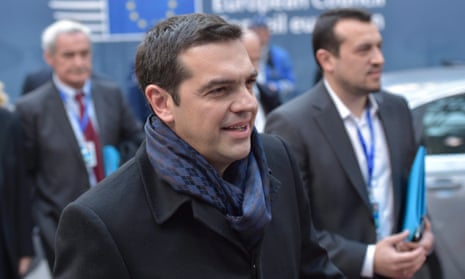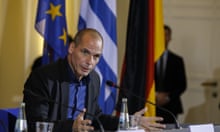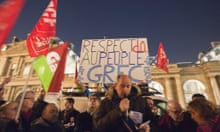The European Central Bank has thrown Greece a lifeline to prevent Athens running out of money before crunch talks with European leaders.
The extension of emergency funding to the Greek finance sector by the eurozone’s central bankers lifted the euro and gave Greece’s prime minister, Alexis Tsipras, a stronger hand before meetings with senior officials at the leaders summit in Brussels.
Tsipras was scheduled to meet the German chancellor, Angela Merkel, in an attempt to hammer out a deal after he told her, following his election a little more than a fortnight ago, that he will lift draconian austerity measures, contravening the terms of the Greek bailout programme.
Greece has failed so far to persuade European leaders that it needs more generous loan financing to alleviate poverty and to promote growth. Talks earlier his week between eurozone finance ministers reached a deadlock after plans put forward by Athens for cheaper long-term loans were rejected.
The ECB has come under pressure to allow Greece to access short-term lending facilities after it said the crisis-hit country no longer qualified for drawing on standard borrowing terms. ECB officials declined to comment, but two sources familiar with the matter told Reuters that the provision of emergency liquidity assistance (ELA) by the Greek central bank would be authorised by the ECB as a temporary expedient.
Arriving for his first EU summit, Tsipras said: “I’m very confident that together we can find a mutually viable solution in order to heal the wounds of austerity, to tackle the humanitarian crisis across the EU, and bring Europe back to the road of growth and social cohesion.”
But in a press conference later he added: “Greece will not blackmail or be blackmailed.”
Merkel, vilified by the Greek left as Europe’s “austerity queen”, said Germany was prepared for a compromise and that finance ministers had a few more days to consider Greece’s proposals. “Europe always aims to find a compromise, and that is the success of Europe,” she said on arrival in Brussels. “Germany is ready for that. However, it must also be said that Europe’s credibility naturally depends on us respecting rules and being reliable with each other.”
Merkel was scheduled to meet Tsipras privately on the sidelines of the one-day informal EU summit, which was meant to focus mainly on the Ukraine crisis and report back on negotiations in Minsk with the Russian president, Vladimir Putin.
Tsipras’s position appeared to weaken before the summit after figures showed a shortfall in Greek tax receipts and a steady flight of savings from the country’s largest commercial banks. Finance ministry data showed tax revenues were €3.49bn (£2.58bn) in January, well below the €4.54bn target set under Greece’s latest budget.
The grim data adds to concerns that Greece will run out of time and money before settling differences with European partners, who want Athens to stick with a debt plan that expires at the end of this month.
Greek households withheld tax payments desperately needed by the new Athens government after it rejected the last payment worth €7.2bn under the existing bailout scheme.
Greek banks have also been hit by a flight of capital to foreign-owned rivals in the runup to snap elections, which propelled Tsipras’s radical left party Syriza to the head of a coalition.
After becoming prime minister, Tsipras appeared to make conciliatory gestures to opponents of his demands for easier credit terms. Optimism improved further after his finance minister, Yanis Varoufakis, failed to repeat previous claims that Greece could only agree a deal that included a debt write-off to reduce the €240bn owed to the EU, the ECB and the International Monetary Fund.
Varoufakis will have another chance to hammer out a deal at an emergency Eurogroup meeting of finance ministers on Monday. But comments by the head of the German central bank, Jens Weidmann, during a speech in London emphasised the gulf between some senior policymakers in the eurozone and the Greek position.
Weidmann said austerity had worked to increase Greece’s competitiveness and that Athens should stick to the current bailout terms.
He said: “The risk of a backlash is particularly high in Greece. However, I firmly believe that it is also in Greece’s own interest to do what is necessary to tackle the structural and fiscal problems it is facing. Greece will continue to need support, but support can only be given if the agreements made are complied with.”




